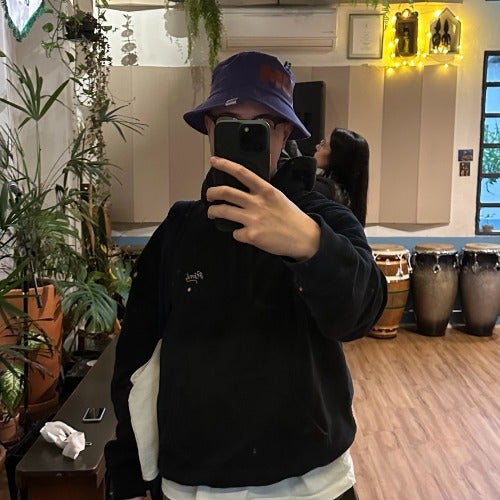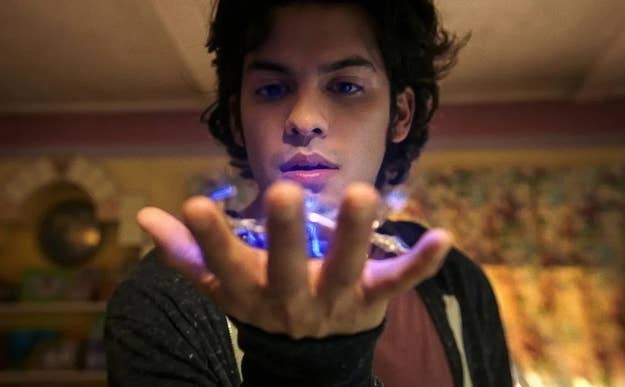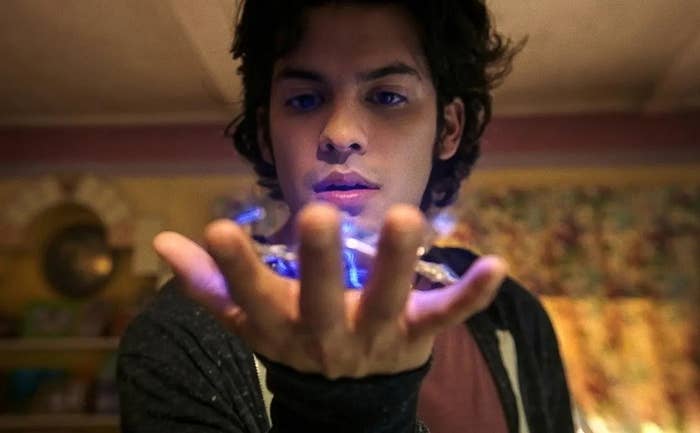
Director Angel Manuel Soto had the opportunity of a lifetime with Blue Beetle.
Introducing the first Latino superhero in a leading role is no easy task. In the realm of Hollywood, where the silver screen often reflects our most cherished dreams and aspirations, a new superhero is poised to soar and shatter conventions. And that’s exactly what visionary director Soto set out to do with his movie.
Blue Beetle invites audiences into a world where heroism knows no bounds—a world where culture, identity, and courage intertwine to create a compelling narrative that transcends the confines of a typical superhero origin story.
Soto's directorial finesse and dedication to authenticity are palpable as he unearths the layers of the creative process that birthed this remarkable tale. In a landscape where representation remains an ongoing struggle, Soto's commitment shines like a beacon, unapologetically dismantling preconceived notions and introducing a character who reflects the rich tapestry of our global community.
Now that Blue Beetle has finally arrived in theaters, we caught up with Soto to hear more about his experience creating the film, landing the perfect casting with Xolo Maridueña, and the importance of representation and diversity in Hollywood.
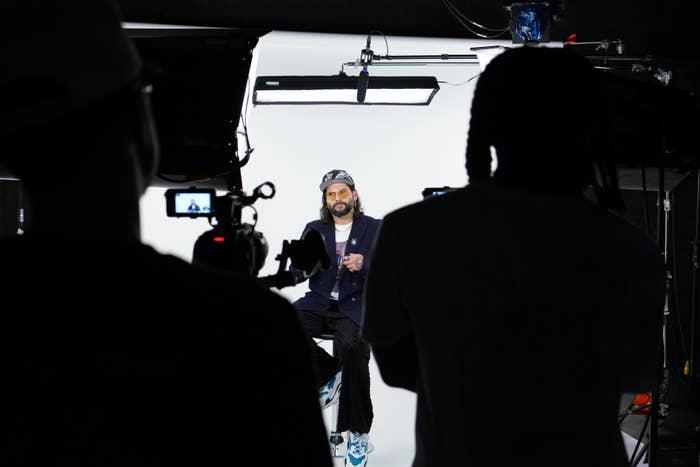
(This story has been edited in length for clarity.)
Well first off, congratulations on the film. Jaime Reyes is a relatively new character in the DC universe. How did you approach adapting him for the big screen?
SOTO: The whole Blue Beetle mantle has been passed around since 1939. There's always something different to be told in those stories. And we know how deeply rooted the fans are to the comics and the animation, so for the Cinematic Universe, we wanted to take the greatest hits of all those different things that inform Jaime’s character.
And the writer, Gareth Dunnet-Alcocer, got to do that because he's a big fan and nerd of the Blue Beetle legacy. So taking the greatest hits of all the different things that made Jaime special and that made Blue Beetle special, we were able to create this beautiful character interpreted by Xolo Maridueña.
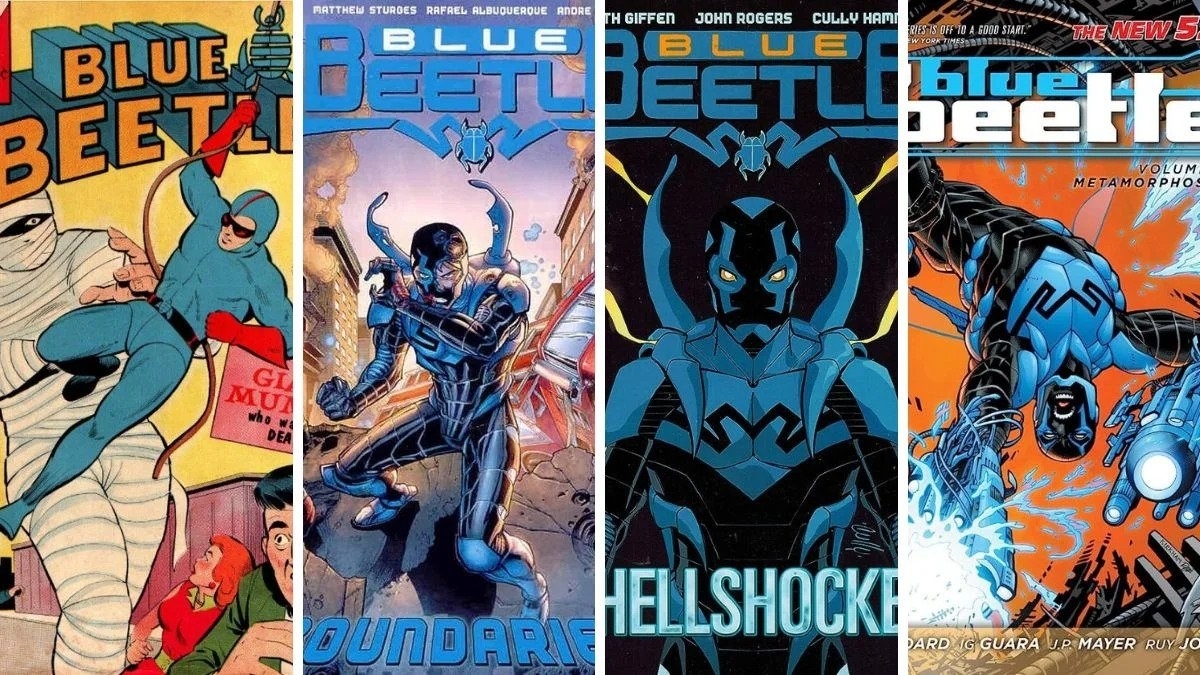
Of course, Jaime Reyes is the first Latino character to get a leading role in a superhero film. How did this inform your creative approach in terms of storytelling and visual representation?
SOTO: Well, for us, you know, the writer got it. He’s from Querétaro, Mexico, and I'm from Puerto Rico. So we are Latinos, and we had the privilege of being able to create and work around an IP that happens to have its hero be Latino, and the family around him are Latino, and his community are Latino. So for us, it was finally an opportunity to be free, to be ourselves.
Let's be free and tell the story that we know that we grew up with. Let's be nostalgic about simpler times and bring that warmth into the film so that the audiences can feel welcome to the story the same way that we feel welcome to our Nana's home. So for us, it was very important to have a conversation with the studio, to let us be ourselves and express ourselves honestly and authentically, without any societal norms or any expectations of what a Latino should be. And we were able to not force anything Latino because that's just who we are.
"For us, it was finally an opportunity to be free, to be ourselves."
I know a lot of the movie was filmed in Puerto Rico. Can you talk about what that was like?
SOTO: So when we created the city, we knew that we wanted to create this metropolitan city, cosmopolitan like Neo Tokyo vibes, but the Latino version of it. So it was inspired by Miami and the neon colors and the vapor wave aesthetics, and we brought in architecture styles from El Paso.
But the barrios of Palmera City, which we call the Edge Keys, are inspired by the barrios of Puerto Rico and are representative of a lot of the barrios in Latin America. So being able to shoot in Puerto Rico as my playground, shooting in the streets that I grew up in, communities that I've known for a long time, that was sort of like a dream come true.
And not only just filming there, I am filming there with my friends too, because I was able to work with the people that helped me make my career, who have worked in all my films, in all my commercials, and also allow to provide jobs and inject money to the economy of Puerto Rico that needs it so badly.
Another huge part of the film that we have to talk about is Xolo. In the casting process of Blue Beetle, what stood out to you with Xolo to cast him as the star?
SOTO: So Xolo, I met him when he was 19. I met him in Sundance and he was such a down-to-earth kid, super charming, good looking, he didn't think he was the shit or anything like that. He was just super accessible and had immense love for his family. So when I get the call to do Blue Beetle, they asked me, who do I want to cast? I said his name instantly.
And not just because his personality and characteristics are similar to that of Jaime’s, but he's also like a copy-paste version of Jaime, the comic. And that was pretty obvious. And also he has a martial arts background, so I think we have the whole package here. I'm like, “Yeah, he's the kid.” “Are you sure you don't want that?” “No it has to be him. It has to be him.”
"They asked me, who do I want to cast? I said his name instantly."
I have to ask about the video you shared to Instagram the other week of Xolo officially landing the role. Do you remember that moment?
SOTO: Yeah, dude, I remember that moment. So we already knew that Xolo was the guy, right? And we've been planning how to communicate it to him, and we decided to punk him a little bit.
So me, the writer, the producers, we were hiding in one corner of the restaurant outside. And while the studio at the time was having a drink with him and they kind of tricked him into like, “No, this is a general meeting we just want to meet.” I don't think they even mentioned this movie at all. So they had that meeting and we were waiting and then they started walking out.
They told us, like, he's going to walk out. And when that happens, I was going to be like, "Hey, Xolo, what's up?" So we did that and he's like, ”Hey, Angel… Hey, everyone.” And that's where he was like, “What the hell's going on?” And that's when I break it to him. You know, if he was interested in being Jaime Reyes. He was like, “Yeah, yeah,” his voice was breaking.
And then we were like, “So who do you want to call first?” And, “I got to call Mom.” So that's when we have that conversation with his mom, Carmelita.
That video was adorable. If you watch it and you don't tear up, you don’t have a heart.
SOTO: Yeah, it is a beautiful video. And that video really confirmed a lot to us. You know, the fact that he's like, “I want to tell my mom first more than anybody else,” it shows you the same spirit and heart and energy that Jaime has with his family. And that vulnerability that he's not afraid to embrace is a power that many of us never had the luxury to have at such a young age. So seeing how humble and thankful he is as a human, it really consolidated the whole idea that he's perfect for it.
“That video really confirmed a lot to us […] It really consolidated the whole idea that he's perfect for it.”
For a lot of characters, you see them onscreen and then you see them in real life and it's hard to disassociate them—but you know there's some distance between them and the characters they play. But we all know with Xolo: that's him. That’s actually Jaime Reyes.
SOTO: It is crazy. But that moment I felt like, “Oh shit, that's him,” was when he came out with the suit on. So we did this video like it was like a sizzle reel and we had him on top of the corner of a building, like eating a taco, just hanging out with the suit and he was like rapping to Drake or whatever.
And when the camera was going up on him, we were like, “That's him. Like, it's, it's definitely him.” And we got to the point that you cannot separate either because what makes Xolo special as a human is what makes Jaime special as a character. So Xolo is Jaime, Jaime is Xolo, the same thing. Same person. Same person for me.
One of the most important lines in the entire movie is when Xolo says, “My family…that's what makes me strong.” Can you talk about working with the cast and capturing the family dynamics onscreen?
SOTO: Yeah, I mean, we definitely knew that the family aspect is important, but it's not that Toretto family aspect of things, but the family aspect of things that grows with you since you were little.
What I did was during the rehearsal days, about two weeks before shooting, I took the script and I said, “Let’s throw it away, this is not important right now.” You guys are now meeting each other for the first time and you have like the first generation, you know, Belisa Escobedo and Xolo. Then we have like the '80s ones, which are like George Lopez and Epidia Carrillo. And then we have the elders, right. So the idea was to let the elders share their stories, like what was their childhood or the sacrifices they had done.
Everything they've lost along the way, how hard it was for them to be the place where they are today. That's something that we get from our parents because we've been with them for 40 years or whatever and they tell you their stories and you have seen them struggle. So there's this respect. There is this respect that exists for them that takes years to create.
So how do we create that respect in such a short period of time? So that's what we do. Instead of rehearsing, we actually told stories about their journeys, about crossing. And all the kids were like, “Oh my God. Like, that story is incredible.” Like, just by looking at you would have never thought. And then you put that now in this act and the scene just plays differently. So that level of respect and admiration visually translates to love.
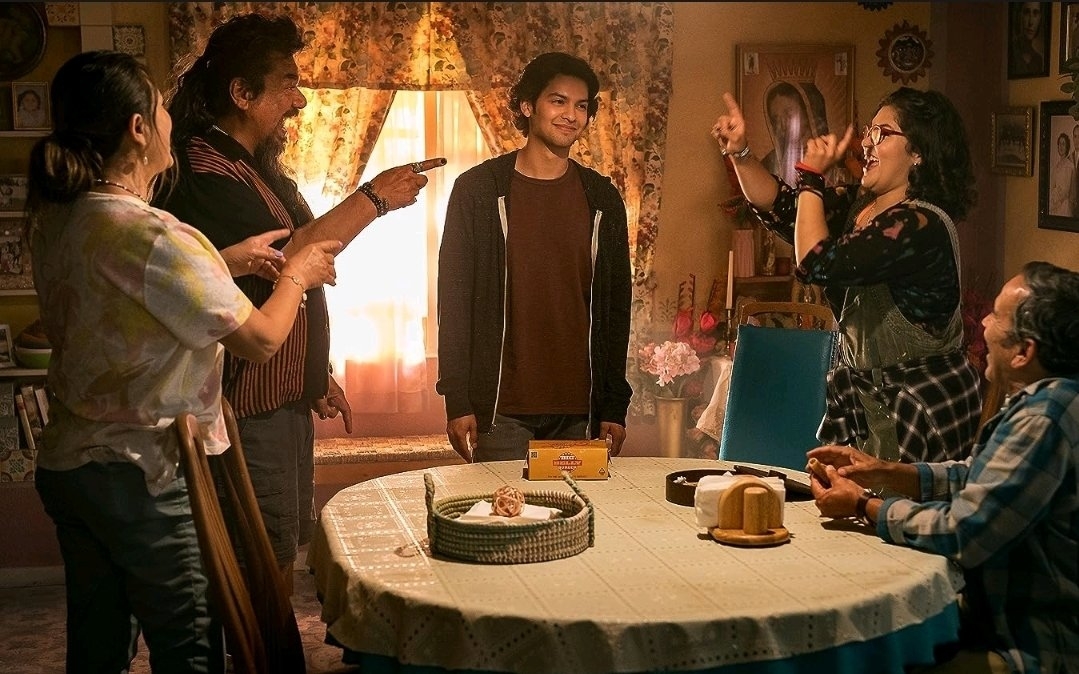
How do you approach creating an authentic story of representation and diversity that doesn’t rely on stereotypes? How do you make it feel genuine and not forced?
SOTO: The best way to avoid them is by hiring people that know the culture. It's literally the only way, unless you do an extensive amount of research and bring the community to tell you, “That's not how we do it, that is how we do it.” But as a Latino, and in my way of filmmaking, I like to respect that. I like to honor that. I serve for that.
Having a writer that's Mexican, he knows what the stereotypes are. We make fun of our stereotypes, which is different, right? If there's a stereotype in the movie, we're making fun of it, but the rest of it is just us.
Having the cast be Mexican, they know what they say. They're telling us how they do it. The Vicks VapoRub wasn't in the script. In the script it was like, “Oh, he's going to wake up to see his family.” But the Vicks VapoRub was Nana. She wasn't feeling well. She had Vicks VapoRub next to her and she's like, “Oh, this will wake him up.” But it came out from her. So that is how authenticity and that's how breaking stereotypes looks like.
Is representation and diversity something you see continuing on with other projects that aren't rooted directly in your culture or directly in something that you can relate to?
SOTO: Yeah, no. 100% like with Charm City Kings, like I am not from Baltimore, I don't ride bikes, you know, I am not African American, but I come from a marginalized community. I come from this community that faces the same conflicts, the same disenfranchisement. You know, Puerto Rico and the Black community do have points of intersectionality that we can all understand; it’s how we have been treated because of colonial oppression.
So, yes, representation for me is important. At the end of the day, there's no way that I could see myself not servicing a representative aspect of life, because at the end of the day, our stories need to be told by people who are like us, who love us, who want to see us shine and be shown in a light that is representative to the people, to the humanity that we know that exists in us.
"At the end of the day, our stories need to be told by people who are like us, who love us, who want to see us shine."
What message do you hope Blue Beetle sends to Latino audiences and the larger superhero fan base about representation and inclusivity?
SOTO: That they shouldn't be scared about all their stories being told by people that don't look like them, you know? And it’s okay to challenge your knowledge and your expectations. I think that's where we have an opportunity there to exchange ideas, to open dialog, to have more empathy, to see that at the end of the day, we're not that different.
I believe there's more things that connect us than divide us and if for whatever reason there is a resistance to that concept, then the problem is not the film and the representation. Maybe the problem is deep inside your heart,
So I guess I think we can all try to open our minds up a little bit and see where we connect and see how we can tell stories that are more specific to different cultures, because it could change the lens in which we see life, in which we see conflict.
Absolutely. I think Blue Beetle is setting a precedent for the future generations of what stories need to be told.
SOTO: If that happens, man, I feel like my purpose is being tailored in the right direction because my goal is for, if anything, to help other people not go through all the hurdles and bullshit that I had to go through to do what their passion is.
If I can bridge the gap or if I can mentor, if I can open doors for other people from marginalized communities to tell stories for other people, from other communities to tell stories, whether it is in the US or in Latin America, that for me will be ideal because I love cinema as much as I love Hollywood. I love world cinema. So why not make world cinema mainstream?
So there's a Man of Steel reference in the movie. And Zack Snyder recently came out and showed love to the film. Can you talk about what it was like to see that?
SOTO: That was crazy. I'm not going to lie. I love Zack Snyder. What's not to love about his career? You know, I've been following him since his commercials.
I think I was in Mexico, in London. I don't remember. And I wake up to Twitter blowing up with a tweet by Snyder and not only supporting the film and saying that he wants to take his kids, but also saying “representation matters,” which is kind of like a big deal coming from a director that has such an intense following.
And for me, I was in awe. I did not know that was going to happen that day. But that type of validation coming from somebody that I respect as an artist, it's humbling and it's exciting too. But it fills me with a lot of gratitude because he did not have to do that, you know?
And then having David Ayer follow up, too, and I'm like, what? Like these two masters of the craft are supporting a movie and supporting representation. It’s like if everybody joins that movement, it's not going to take as long as it took for us to get here.
Finally, we have to speak about the cast, as they’re not here. What’s been your experience promoting this film on your own without them?
SOTO: It is tiresome, you know, and every time you talk about this moment, you always think about it with them because you want to. I celebrate them, I am behind the cameras. I'm not trained for this, but what I am passionate about is the love and the work that they did because they understood the assignment.
They understood what their participation in this movie represents for the culture. They understood that they're actually doing something that we never had the chance to experience growing up, which was seeing ourselves in a movie, playing a hero and a family, too.
But at the same time, I know and they know that this sacrifice that they're doing, even though they're Latinos and minorities are sometimes affected disproportionately when it comes to things like this, especially when some of them are not even SAG, but they understand. They understand that this protest, this strike is going to pave the way for future generations.
This strike is going to allow actors to have a dignified pay and fair compensation. So that's why my support is always with them. Yes, it's sad. Yes, it hurts. But they're being selfless to their sacrifice and this opportunity of showing the world the amazing work that they did, being like the first crew of superheroes, authentically Latinos, saving the world to be heroes in the picket line for a better future.
And that alone deserves all the respect and support they can get.
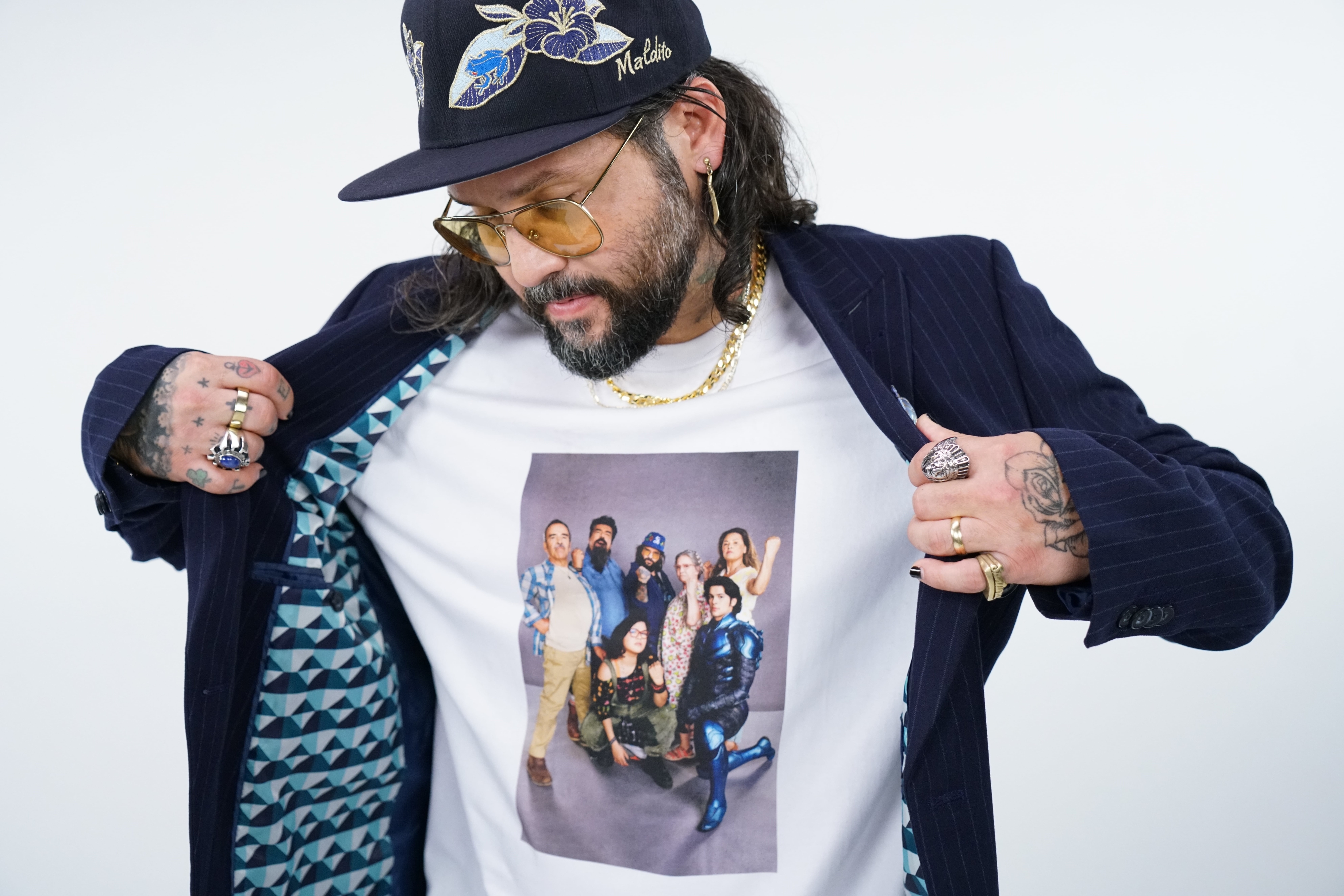
Blue Beetle officially arrived in theaters on August 18, 2023. Watch the trailer below for the DC film.
